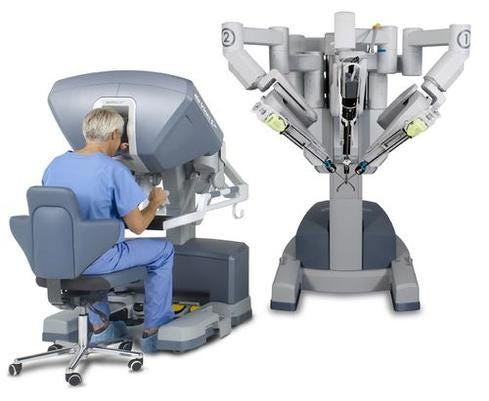Voice Recognition Speeds EHR Use For Oklahoma HospitalVoice Recognition Speeds EHR Use For Oklahoma Hospital
In addition to reducing doctors' note-taking burden, Dragon Medical software saved the Norman Regional Health System $1.8 million in transcription services last year.


Surgical Robots: Look Who's Coming To The OR
Surgical Robots: Look Who's Coming To The OR (click image for larger view)
Dr. Brian Yeaman sees voice recognition as one way of making logging notes in electronic health records less of a hassle and more of a productive tool. "The further I can get away from a keyboard and a mouse, the better."
Yeaman is a family medicine physician and hospitalist as well as chief medical informatics officer for the Norman Regional Health System in Oklahoma. Using the Dragon Medical voice recognition software from Nuance Communications, Norman Regional has found it can minimize a key physician complaint about electronic health records and save the money that previously went to transcription services. The net savings after the cost of the software last year came to about $1.8 million, Yeaman said.
The Dragon software is currently being used mostly in the emergency department in combination with Nuance's Powermic, a noise-canceling microphone capable of working amid chaos -- proving its value even during a crisis. When a tornado wiped out a school and most of the town of Moore, Okla., in May, it also destroyed the Norman Regional medical center in that town. Casualties and displaced patients poured into the main campus in Norman. "We had patients in every room and lined up down the hall," but even then "we never abandoned the technology."
[What healthcare changes are on the way, for better or worse? 9 Digital Health Trends For 2014.]
Use of the Powermic is "a must," Yeaman said.
On a more routine basis, voice recognition allows doctors to record their notes quicker and easier. "That's certainly one of the largest physician complaints -- to say, 'I'm not a data entry specialist. I'm not a typist, not a transcriptionist. That's not my job.' What we have to bring to physicians is an experience that mimics what all get in our personal lives, that's more user friendly and keeps up with the expectation we've gotten from the utilization of mobile devices."
Too often, when physicians are forced to record notes electronically rather than jotting down unstructured notes, "you lose the story." The record is less complete on the physician's thoughts on "if this doesn't work, here's what I'll do next." Even though EHRs allow room for this sort of narrative note taking, the online medium tends to constrain what is recorded.
"They're not going to type, as many of them do, 10 words a minute" and get all the same details on the record. "Or if they dictate, then transcription costs go through the roof." Voice recognition provides the convenience of dictation without that expense. The computerized transcription is not always perfect, but it's no worse than manual transcription. Physicians do have an opportunity to correct errors, though some are better about that than others.
The Nuance software has been integrated with the Meditech EHR for inpatient care and eClinicalWorks, which the health system uses for ambulatory care. In both cases, the integration was fairly straightforward. Dragon was first implemented in the emergency department but is beginning to find its way into the hospital's laboratory operations and ambulatory care services, with plans for a broader deployment throughout the health system this year.
Yeaman said he is also testing "clinical language understanding" software from Nuance with the hope of beginning to use it in 2014. The idea for the software not just to transcribe what is dictated, but also to understand the content of the dictation well enough to prompt a physician to enter more complete information -- with the ultimate payoff of more accurate processing of insurance claims and improved quality reporting.
"By recognizing that I said 'Congestive heart failure,' the software can ask, 'Systolic or diastolic?' If that can be a query that presents itself to the physician at the time of dictation, we can get a higher rate of answering those queries appropriately, and the hospital or clinic gets the right level of reimbursement," Yeaman said.
David F. Carr is the editor of Information Healthcare and a contributor on social business, as well as the author of Social Collaboration For Dummies. Follow him on Twitter @davidfcarr or on Google+.
Though the online exchange of medical records is central to the government's Meaningful Use program, the effort to make such transactions routine has just begun. Also in the Barriers to Health Information Exchange issue of information Healthcare: why cloud startups favor Direct Protocol as a simpler alternative to centralized HIEs (free registration required).
About the Author
You May Also Like






